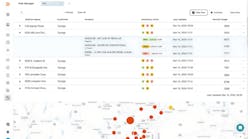The American Trucking Associations (ATA) legal challenge to Los Angeles and Long Beach ports concession plans has been remanded to a US District Court.
ATA said the US Court of Appeals for the Ninth Circuit ruled in favor of the association in its lawsuit seeking an injunction against the Ports of Los Angeles and Long Beach concession plans.
The ruling also indicated that the judge should grant ATA an injunction against all or part of the concession plans.
"We are extremely pleased with the decision," said Robert Digges Jr, ATA vice-president and general counsel. "The judges understood that most of the elements of the plans are not about safety, but rather are a regulatory effort by the ports to create what they believe would be a more efficient drayage system."
As of October 1, 2008, any motor carrier out of compliance with a port’s concession agreement had been barred from entering that port, a situation that caused motor carriers to suffer both short and long-term capital losses and injuries to business goodwill, ATA said.
ATA also pointed out that the court addressed the Port of Los Angeles's ban on owner-operators. "That requirement is dead," said Curtis Whalen, executive director of the Intermodal Motor Carrier Conference (IMCC) of the ATA. The Port of Long Beach Concession Plan did not ban owner-operators.
ATA said earlier earlier that the concession plans impose a broad range of operational requirements that create a regulatory environment very similar to state intrastate economic regulation. Access to the ports would be granted to only those trucking companies that have entered into concession contracts approved by the port program administrator.
ATA said in its original lawsuit filing that the association specifically asserts that the ports’ actions violate the federal statutory provision (49 USC 14501) which prohibits states or their political subdivisions from enacting or enforcing a legal requirement that is "related to a price, route, or service of any motor carrier." The filing points to a host of regulatory requirements (for example, submission of truck-maintenance, safety and parking plans; equipment marking and tracking; financial oversight; routing mandates; and periodic reviews and audits) that will dramatically affect a motor carrier’s operations at the ports in terms of price, routes, and services.








